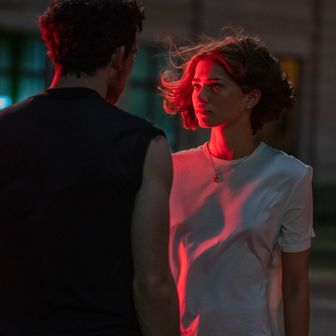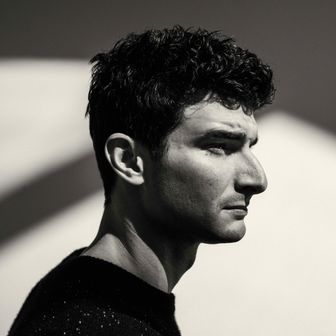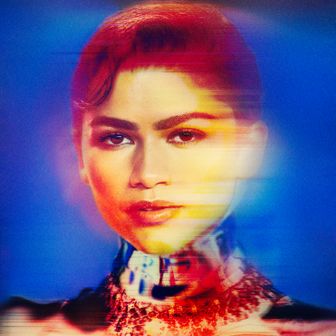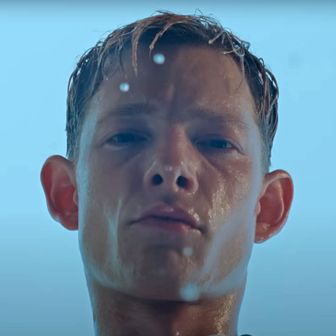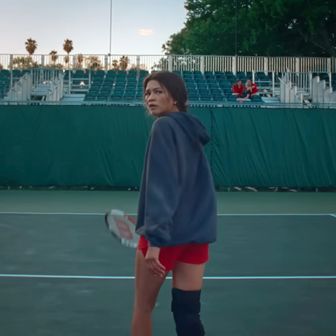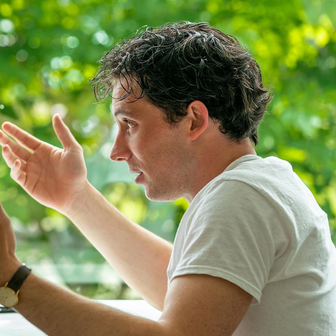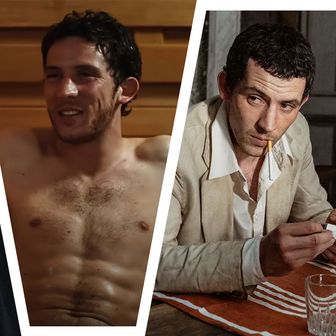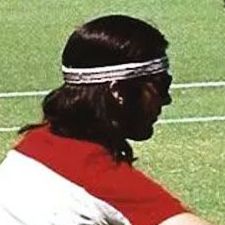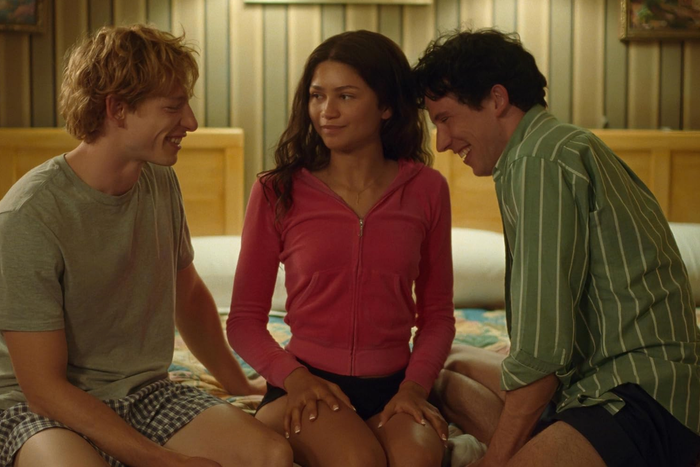
The official line on Challengers is that the movie, despite hinting at the possibility in its marketing, does not actually contain a scene in which Mike Faist and Josh O’Connor have a threesome with Zendaya. I am here to tell you that that is too literal of a ruling. The wildly sexy Challengers may not feature any onscreen sex, but it does conclude with a tennis match that plays like a consummation of the hookup the three characters come close to having when they first meet. Whether on the court or in bed, Art Donaldson (Faist), Patrick Zweig (O’Connor), and Tashi Duncan (Zendaya) are defined by their relationships with competition — there’s no separation between their athletic activities and their personal lives. Or as Tashi says to Patrick when he asks if they’re talking about tennis in the midst of a dorm-room canoodle: “We’re always talking about tennis.” Luca Guadagnino’s film isn’t coy about sex; it just treats all that foreplay as the equivalent to what plays out on the court.
In other words, the sport doesn’t serve as a sublimated form of fucking in Challengers so much as the fucking serves as an extension of the sport. That’s why the abortive-threesome sequence is less a tease than an open parenthesis, one that’s only closed once the movie, which is peppered with flashbacks from its 13-year timespan, catches up with itself and focuses entirely on the end of a match between the now-grown Art and Patrick at a rinky-dink tournament in New Rochelle. When Art and Patrick first meet Tashi at the Junior US Open, where they’re left as slack-jawed by her backhand as her beauty, they’re tennis-academy roommates and doubles partners who share a codependent closeness more often depicted in teenage girls. Art is measured, dedicated yet prone to willing himself into losing, while Patrick is all unshakeable confidence and raw talent with no follow-through. Tashi is the independent one, a prodigy who loves to win but who’s also all business about building a career that will allow her to support her family. What intrigues her about the boys isn’t just that they’re cute, though they are — like big-eared puppies falling all over each other to get her attention — but that they both make their desire to pursue her clear.
They’re willing to compete for her and, in doing so, potentially disrupt their established hierarchy where Patrick takes the lead, whether it’s in jerking off, going pro, or inviting Tashi to hang out. When she does swing by their shared Flushing hotel room (the settings in Challengers are a gloriously unatmospheric slew of chain lodging, strip-mall restaurants, and parking lots), it’s obvious that she’s going to dictate the terms of whatever might take place, but also that she hasn’t yet decided what that might be. The scene is so enjoyable, the atmosphere heady with lust and the efforts of three teens trying to appear more sophisticated than they are, because Tashi digs right into the dynamic Art and Patrick have accrued over years of growing up together and playing both with and against each other. She observes that they’re like brothers, but there’s a different sort of closeness implied by the revelation that they’ve shared at least one formative sexual milestone together (not to mention the fact that they apparently push their beds together when sharing a room on the road). Patrick, I’ll posit after two viewings and extra attention to O’Connor’s use of sidelong glances, harbors some unaired feelings for Art, while Art in turn is sitting on some unacknowledged resentment.
When Tashi Y Tu Mamá Tambiéns them, kissing one, then the other, and then guiding them into a lush group makeout that keeps going after she strategically withdraws, it’s not because she believes they’re in denial about their interest in her. That cat-that-got-the-cream grin that spreads across her face as she watches them kiss is that of a girl who’s gotten people to show her aspects of themselves they might not even have been aware of. Art and Patrick may act like a unit, but they have a lot to work out on the court. And Tashi, who offers her number to the winner of their match the next day, isn’t joking when she says she just wants to watch “some good fucking tennis.” It’s Tashi who articulates the film’s deeply romantic conception of the sport when the three characters talk at a party as she sits next to the ocean in her blue dress like a mermaid deigning to pay a temporary visit. Tennis, she proposes, is a relationship, and during the match she played earlier that day, there was a stretch when it was as though she and her opponent were in love, or had disappeared: “We understood each other completely, and so did everyone watching.” In Challengers, tennis is a vector for intimacy on a level that can’t be competed with — by friendship, by marriage, or by sex.
And that idea is fully realized in that last game in New Rochelle, for which Guadagnino pulls out all the stops. He drops the camera into the perspective of his players and then into that of the ball, as though wanting to put us inside the activity that allows for such unprecedented connection. But he also brings us back to the hotel room by recreating a shot from that earlier sequence, with Tashi in the center of the frame and the guys on either side, gazing at her. She may be in the crowd while they’re on the court this time, but all three are once again in communion. What this final bout emphasizes is the unabashed physicality of it all, Art and Patrick drenched in sweat as they get closer and closer to the net and to each other, their grunts of effort sounding borderline carnal. Because we never see these characters have sex, of all the scenes in which they are bodily entangled — the trio in that room, yes, but also Art and Patrick grappling in celebration after winning their doubles championship, Tashi and Patrick in her bed at Stanford, Art and Tashi kissing outside a Cincinnati Applebee’s — this is the one in which everyone gets most visibly worked up, including Tashi, who wrings her hands on the sidelines.
Here it is, at last, after years of these characters’ lives spent struggling to articulate what they want — closeness by way of real competition. The smiles that Art and Patrick give each other before serving, a genuine acknowledgment after a decade of estrangement, are as thrilling as the volley they go on to have, ending in what can’t be described as anything but a climax. It may not be fucking in the literal sense, but it really is some good fucking tennis.
More on Challengers
- The Death of the Classic Film Score
- Why the Oscars Ignored Challengers
- The Challengers Score Should Be Played at the Club


